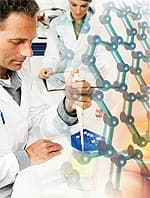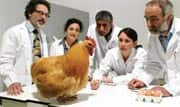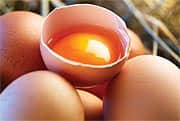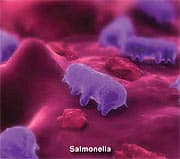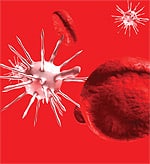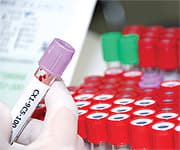Life Extension Magazine®
Age-related loss of immune function is called “immunosenescence,” a term first coined by Dr. Roy Walford, who was Emeritus Professor of Pathology and Laboratory Medicine at UCLA and formerly a member of the Life Extension® Medical Advisory Board. In his historic book, The Immunologic Theory of Aging (Munksgaard, 1969), Dr. Walford discusses in detail how a declining immune system is one of the major causes of systemic aging—including a growing risk for cancers, infections, and inflammatory conditions.1 Researchers concerned with finding solutions to cure diseases often start with a look at the human immune system. Without the invisible wall of defense provided by a well-regulated immune system, we are susceptible to virtually every imaginable disease, from pneumonia to arthritis to diabetes.2-4 Even cancer and cardiovascular diseases are quick to take advantage of our weak spots—or over-activity—of normal immune function.5,6 Infections and cancers arise when the immune system loses its normally intense surveillance.7 Cancer victims are particularly vulnerable to infections because both the disease and many of its therapies further weaken the immune system. Autoimmune disorders, on the other hand, occur when the natural restraints on immune reactivity fade, allowing an uncontrolled inflammatory response to take place.8 And that inflammatory response, in turn, can increase the risk of cancer.9 The good news is that if we can protect and even enhance the aging immune system, we may be able to substantially delay the pathological impact of aging itself.10,11 Scientists are constantly seeking out new methods of boosting immunity, through supplements, diet, exercise, sleep, and of course expensive medications that appeal to the pharmaceutical industry. Interestingly, leading scientists have discovered how to provide natural immunological support using immune-protective proteins found in hens’ eggs. This development promises to deliver substantial immune enhancement at a fraction of the cost of medications.12 That’s good news for all of us as we age—and great news for those whose immune systems are particularly vulnerable, such as cancer patients or those living with HIV/AIDS. Creating the Hyperimmune Egg
Agricultural scientists long ago discovered that they could immunize hens against germs that threaten humans. This immunity was then passed on by the hen to her egg.13-15 Concentrated protein extracts from those so-called “hyperimmune eggs” confer remarkable levels of immunity to humans who consume them.16,17 Scientists have now been able to customize eggs to provide different types of immunity. At least 24 different organisms have been used to immunize a single hen, which then lays eggs that offer passive immunity to all of the organisms.14 Let’s now look at how hyperimmune egg extracts provide unique immune protection and reverse some of the deficits caused by age-related immunosenescence. Managing CholesterolAtherosclerosis is another manifestation of immunosenescence, as decreased control over inflammation facilitates the formation of arterial plaques in a process often referred to as “inflamm-aging.”18,19 The US Army Research Institute of Environmental Medicine became interested in this process because of the shocking number of soldiers with elevated cholesterol levels and decided to study the potential of hyperimmune egg extract to lower cardiovascular risk.20 What they found was that soldiers who used a drink containing hyperimmune egg powder stabilized their cholesterol compared to the placebo group.20 This was a fascinating finding, considering that eggs are often maligned as being the source of high cholesterol. In the study, military personnel—sergeants major in the US Army with elevated total cholesterol (greater than 180 mg/dL)—participated in a 26-week double-blind, placebo-controlled study of a drink containing hyperimmune egg extract.20 All subjects were physically fit people who also participated in a dietary education program to reduce fat and cholesterol intake. By the end of the trial, total cholesterol levels of placebo recipients had increased, while those in the supplemented group showed no change. Similarly, in placebo subjects, the ratio of total cholesterol to HDL increased (a bad finding), while again no change was observed in the supplemented group. These findings suggested to the researchers that “hyperimmune egg might beneficially modify the regulation of serum lipoprotein levels and thereby reduce the possibility of cardiovascular disease.”20 Fighting Inflammation and ArthritisAs our immunity declines, we can also experience increased immune reactivity in the form of excessive inflammation. This seeming paradox occurs because the immune system includes powerful feedback mechanisms that normally control inflammation once the true threat has faded.8 With deteriorating overall immune function, that regulatory capability declines, leaving us vulnerable to conditions characterized by excessive inflammation.18 The drop in our immune regulatory function with aging brings with it chronic autoimmune conditions such as lupus and rheumatoid arthritis. Notoriously difficult to treat, hyperimmune egg and similar preparations have shown considerable success in reducing inflammation in animal models.14,21-23 An astonishing human study from Weill Cornell Graduate School of Medical Sciences demonstrated the power of hyperimmune egg therapy in patients with various forms of arthritis.24 There was a significant improvement following the start of supplementation and there was a strong trend for improvement in the patients with rheumatoid arthritis as well. Improvement was sustained for at least 30 days after patients stopped taking the supplement. The researchers believed that the hyperimmune egg preparation may have reduced the intestinal burden of organisms that tend to cross-react with human tissues during the autoimmune response.24 Oral HealthImmunosenescence brings with it many negative changes to the oral cavity, particularly the teeth and gums, which can harbor infectious organisms and massive inflammation that contribute to chronic conditions, such as cardiovascular disease.25,26 Dental plaque is a biofilm of bacteria and inflammatory molecules that increase the risk of both cavities and gum inflammation (gingivitis). Hyperimmune egg extract has been shown to reduce the volume of dental plaque, which in turn cuts down on the total load of inflammation in the mouth.27 And animals supplemented with hyperimmune egg against the leading bacterial cause of caries developed significantly lower caries scores than did control animals.28,29 Oral hyperimmune egg rinses have also been used successfully in humans to reduce their burden of disease-causing bacteria; the extracts remain active and present in the mouth at least overnight, offering long-standing protection.30-32 Hyperimmune egg-containing toothpaste and gum implants have even been used in the battle against tooth and gum disease.33
Gastrointestinal InfectionsImmunosenescence has tremendous implications for the human gastrointestinal (GI) tract, which is one of our largest organs that interacts directly with the outside world. Normal GI immune protection allows only beneficial nutrients and fluids to pass while excluding the millions of dangerous organisms. The normal GI tract also secretes beneficial IgA antibodies that coat and isolate bacteria. And the GI tract contains its own set of vigilant immune system cells that recognize and respond to threats instantly. With aging, all of those GI immune functions diminish, leaving us vulnerable not only to GI-related infections and to diarrhea, but also to malignancies such as colon cancer, one of the top killers of the elderly.34-36 In fact, bacterial overgrowth, extending into the small intestine, is a significant problem that is commonly misdiagnosed in the elderly.37
Unfortunately, most common viral GI infections don’t respond to antibiotics, and some can actually be exacerbated by them.38,39 We need to find a better way, one that relies not on killing the organisms with chemicals, but rather inactivates them where they live and prevents their spread. Hyperimmune egg extracts appear to offer just such a better approach. The most notorious harmful microorganisms in humans are the bacteria Salmonella and E. coli and the common virus called rotavirus. In animal studies, efficacy rates for the use of the hyperimmune egg preparation are typically near 100%, even when the egg preparation is given after infection.40-44 For example, mice were protected against rotavirus and Salmonella infection by oral administration of the hyperimmune egg.44-46 Astonishingly, experimental animals also received partial protection against strains other than those to which the hens had originally been immunized!42,44 Of equal importance for public health officials, hyperimmune egg-supplemented subjects excrete little or no virus or bacteria, compared with the high rates of viral and bacterial transmission seen in controls.47-50 Even when used for treatment, after an infection has already taken hold, hyperimmune egg can be effective, producing cure rates as high as 84% and reducing excretion of germs in the stool. Interestingly, in human studies by world-renowned expert S.A. Sarker at the Center for International Diarrheal Disease Research, hyperimmune egg proved similarly effective at treating infant rotavirus diarrhea compared with a similar milk-based colostrum preparation.17,51 It’s clear that hyperimmune egg has the potential to prevent and treat dangerous and uncomfortable gastrointestinal infections. But many other roles are emerging for this discovery. Let’s examine how hyperimmune egg can prevent other kinds of infections.
|
Other Antibacterial EffectsOf course, waning immunity resulting from immunosenescence leaves us vulnerable to a wide variety of bacterial infections outside of the GI tract as well. Hyperimmune egg extracts are showing promise in many such infections. Patients with cystic fibrosis (CF) are especially at risk for colonization of their lungs with Pseudomonas aeruginosa (PA), an organism that thrives in their overly-viscous mucous secretions. PA infection is in fact the major cause of death and disability in cystic fibrosis patients.52 But among cystic fibrosis patients who gargled with an hyperimmune egg preparation from hens immunized against PA, none became chronically colonized with the organism, while 24% of control subjects did.52 Hyperimmune egg has also proven effective for other, less serious but more common respiratory tract infections. There was a dramatic reduction in symptoms among people with both acute and chronic bacterial sore throat when they used a hyperimmune egg-containing throat spray, compared with placebo-treated subjects.53 Exercise and FitnessImmunosenescence threatens muscle mass, cardiac function, and overall fitness, the result of increased circulation of inflammatory cytokines and increased susceptibility to infection.54 At the same time, moderate exercise is known to be beneficial to older adults,55 but brings with it some risk of muscle injury and even increased inflammation. A group of studies from the Human Performance Laboratory at the College of Charleston, SC, has revealed that hyperimmune egg supplements may hasten recovery from exercise-induced muscle damage. The supplements increase production of growth hormone, a vital mediator of tissue maintenance and repair.56 Supplemented subjects saw an increase in their bench press strength and endurance, decreased muscle soreness, and enhanced muscle repair during recovery.57 At the same time the supplemented subjects had a decrease in their heart rate and increase in their peak power during aerobic workouts.58 People Living with HIV/AIDS
In many ways, infection with the human immunodeficiency virus (HIV) mimics accelerated immunosenescence with its diminished immunity and increased inflammation.59 A study of people living with HIV/AIDS demonstrated remarkable benefits from consumption of hyperimmune egg extract.60 Supplemented subjects saw overall improvement in their quality of life, including marked reductions in anorexia, abdominal pain, diarrhea, short-term memory loss, dizziness, headache, fatigue, and poor sleep. Pain and difficulty breathing were reduced as well, and 100% of subjects experienced significant weight gain by the end of the 8-week study. Markers of inflammation fell significantly, and the all-important CD4 lymphocyte count, an indicator of immune function, improved in 20% of patients. This is a tremendously important finding, given the profound immune suppression and wasting that is typically seen in HIV/AIDS and the exorbitant expense of standard treatment. The possibility that an inexpensive and readily distributed egg extract could relieve so much suffering offers an important breakthrough. Supporting Immune Health in Cancer PatientsImmunosenescence is a significant factor in increasing our risk for cancer, as the immune system’s normally high level of surveillance for potential malignancies tapers off. At the same time, cancer, like HIV/AIDS, brings with it a kind of accelerated immunosenescence, as cancer cells invade and destabilize their unfortunate hosts. Chemotherapy typically exacerbates the situation in most cancers, leaving cancer patients even more vulnerable to infection. The GI tract in particular takes a hard hit from both cancer and chemotherapy, both of which increase intestinal permeability and allow dangerous infections to enter the body.61
Astonishingly, orally administered antibodies of various kinds are showing real promise in ameliorating the effects both of cancer and of chemotherapy on the GI tract.62 A mixture of human IgA and IgG antibodies, given orally to bone marrow transplant patients, prevented the dangerous increase in intestinal permeability that was seen in placebo patients.63 And animal-derived immunoglobulins (similar to the biologically active proteins in hyperimmune egg extracts) were able to reduce fungal colonization when given orally to bone marrow transplant recipients.64 These studies validate the concept of using hyperimmune egg to provide strong GI immunity support in dangerously immune-suppressed cancer patients, and point the way to future studies with even more dramatic results. SummaryWe live in a hostile world, surrounded by an environment filled with germs and toxins that can harm us acutely or cause us chronic pain and misery. As we age, immunosenescence weakens our immune system, rendering us vulnerable not only to dangerous infections, but also to cancers and even to autoimmune and other inflammatory conditions. Biomedical chemistry and pharmaceutical approaches often fail to rectify the situation, and indeed can exacerbate our risks (as in the case of excessive antibiotic prescribing, which leads to newly dangerous organisms). The humble hen’s egg, however, is a natural repository for protective elements that can promote human health. Hens that have been immunized against human disease-causing organisms lay eggs enriched with substances that have the potential to improve human health, both in the gastrointestinal tract and in other parts of the body. Diseases such as gastrointestinal and other infections, as well as those caused by excessive inflammation, are all legitimate targets of hyperimmune egg supplementation. Moreover, hyperimmune egg supplements can improve immunity in people living with HIV/AIDS and even show potential for providing strong immunity support in cancer victims. There’s no question: hyperimmune eggs offer a unique approach to protecting health and longevity. If you have any questions on the scientific content of this article, please call a Life Extension® Health Advisor at 1-866-864-3027. Editor's NoteScience continues to evolve, and new research is published daily. As such, we have a more recent article on this topic: Combat Immune Senescence | ||||
| References | ||||
| 1. Effros RB. Roy Walford and the immunologic theory of aging. Immun Ageing. 2005 Apr 25;2(1):7. 2. Lindstrom TM, Robinson WH. Rheumatoid arthritis: a role for immunosenescence? J Am Geriatr Soc. 2010 Aug;58(8):1565-75. 3. Zeitler P. Approach to the obese adolescent with new-onset diabetes. J Clin Endocrinol Metab. 2010 Dec;95(12):5163-70. 4. Sannikova TE, Marchuk GI, Romaniukha AA, Iashin AI. Immune system senescence and mortality dynamics. Role of antigenic load. Adv Gerontol. 2003;12:91-8. 5. Pawelec G, Derhovanessian E, Larbi A. Immunosenescence and cancer. Crit Rev Oncol Hematol. 2010 Aug;75(2):165-72. 6. Mann DL, Topkara VK, Evans S, Barger PM. Innate immunity in the adult mammalian heart: for whom the cell tolls. Trans Am Clin Climatol Assoc. 2010;121:34-50; discussion 50-1. 7. Gupta S, Bi R, Su K, Yel L, Chiplunkar S, Gollapudi S. Characterization of naive, memory and effector CD8+ T cells: effect of age. Exp Gerontol. 2004 Apr;39(4):545-50. 8. Gupta S, Agrawal A, Agrawal S, Su H, Gollapudi S. A paradox of immunodeficiency and inflammation in human aging: lessons learned from apoptosis. Immun Ageing. 2006 May 19;3:5. 9. Probst-Hensch NM. Chronic age-related diseases share risk factors: do they share pathophysiological mechanisms and why does that matter? Swiss Med Wkly. 2010 Sep 1;140:w13072. 10. Pfister G, Savino W. Can the immune system still be efficient in the elderly? An immunological and immunoendocrine therapeutic perspective. Neuroimmunomodulation. 2008;15(4-6):351-64. 11. Dorshkind K, Montecino-Rodriguez E, Signer RA. The ageing immune system: is it ever too old to become young again? Nat Rev Immunol. 2009 Jan;9(1):57-62. 12. Pawelec G, Barnett Y, Forsey R, et al. T cells and aging, January 2002 update. Front Biosci. 2002 May 1;7:d1056 13. Dias da Silva W, Tambourgi DV. IgY: a promising antibody for use in immunodiagnostic and in immunotherapy. Vet Immunol Immunopathol. 2010 Jun 15;135(3-4):173-80. 14. Dean KL. Hyperimmune eggs capture natural immune support. Altern Complemen Ther. June 2000;6(3):118-24. 15. Cama VA, Sterling CR. Hyperimmune hens as a novel source of anti-Cryptosporidium antibodies suitable for passive immune transfer. J Protozool. 1991 Nov-Dec;38(6):42S-43S. 16. Fujibayashi T, Nakamura M, Tominaga A, et al. Effects of IgY against Candida albicans and Candida spp. Adherence and biofilm formation. Jpn J Infect Dis. 2009 Sep;62(5):337-42. 17. Sarker SA, Casswall TH, Juneja LR, et al. Randomized, placebo-controlled, clinical trial of hyperimmunized chicken egg yolk immunoglobulin in children with rotavirus diarrhea. J Pediatr Gastroenterol Nutr. 2001 Jan;32(1):19-25. 18. Franceschi C, Bonafe M, Valensin S, et al. Inflamm-aging. An evolutionary perspective on immunosenescence. Ann N Y Acad Sci. 2000 Jun;908:244-54. 19. Candore G, Caruso C, Jirillo E, Magrone T, Vasto S. Low grade inflammation as a common pathogenetic denominator in age-related diseases: novel drug targets for anti-ageing strategies and successful ageing achyperimmune eggvement. Curr Pharm Des. 2010;16(6):584-96. 20. Karge WH, Deluca JP, Marchitelli LJ, et al. Pilot study on the effect of hyperimmune egg protein on elevated cholesterol levels and cardiovascular risk factors. J Med Food. 1999;2(2):51-63. 21. Murosaki S, Yoshikai Y, Kubo C, et al. Influence of intake of skim milk from cows immunized with intestinal bacterial antigens on onset of renal disease in (NZB x NZW)F1 mice fed ad libitum or restricted in energy intake. J Nutr. 1991 Nov;121(11):1860-8. 22. Ormrod DJ, Miller TE. The anti-inflammatory activity of a low molecular weight component derived from the milk of hyperimmunized cows. Agents Actions. 1991 Mar;32(3-4):160-6. 23. Ormrod DJ, Miller TE. Milk from hyperimmunized dairy cows as a source of a novel biological response modifier. Agents Actions. 1993;38 Spec No:C146-9. 24. Greenblatt HC, Adalsteinsson O, Kagen L. Administration to arthritis patients of a dietary supplement containing immune egg: An open-label pilot study. J Medicinal Food. 1998;1(3):171-9. 25. Klosinska A, Nowacka M, Kopec G, et al. Periodontitis and the risk of cardiovascular diseases - review of epidemiological studies. Kardiol Pol. 2010 Aug;68(8):973-6. 26. Bodineau A, Folliguet M, Seguier S. Tissular senescence and modifications of oral ecosystem in the elderly: risk factors for mucosal pathologies. Curr Aging Sci. 2009 Jul;2(2):109-20. 27. Hatta H, Tsuda K, Ozeki M, et al. Passive immunization against dental plaque formation in humans: effect of a mouth rinse containing egg yolk antibodies (IgY) specific to Streptococcus mutans. Caries Res. 1997;31(4):268-74. 28. Otake S, Nishihara Y, Makimura M, et al. Protection of rats against dental caries by passive immunization with hen-egg-yolk antibody (IgY). J Dent Res. 1991 Mar;70(3):162-6. 29. Mitoma M, Oho T, Michibata N, et al. Passive immunization with bovine milk containing antibodies to a cell surface protein antigen-glucosyltransferase fusion protein protects rats against dental caries. Infect Immun. 2002 May;70(5):2721-4. 30. Carlander D, Kollberg H, Larsson A. Retention of specific yolk IgY in the human oral cavity. BioDrugs. 2002;16(6):433-7. 31. Wang WH, Wang WJ, Zhang BX. Effect of IgY solution on dental plaque. Zhonghua Kou Qiang Yi Xue Za Zhi. 2003 Nov;38(6):417-9. 32. Zhou Z, Zhou R, Tang Z. Effects of topical application of immunoglobulin yolk on mutans streptococci in dental plaque. Hua Xi Kou Qiang Yi Xue Za Zhi. 2003 Aug;21(4):295-7. 33. Chi ZB, Gao YX, Pan Y, Zhang B, Feng XP. The inhibitive effect of IgY toothpaste against oral Streptococcus mutans. Shanghai Kou Qiang Yi Xue. 2004 Aug;13(4):256-8. 34. Kawanishi H. Recent progress in senescence-associated gut mucosal immunity. Dig Dis. 1993;11(3):157-72. 35. Schmucker DL, Heyworth MF, Owen RL, Daniels CK. Impact of aging on gastrointestinal mucosal immunity. Dig Dis Sci. 1996 Jun;41(6):1183-93. 36. Jemal A, Siegel R, Xu J, Ward E. Cancer statistics, 2010. CA Cancer J Clin. 2010 Sep-Oct;60(5):277-300. 37. Riordan SM, McIver CJ, Wakefield D, Bolin TD, Duncombe VM, Thomas MC. Small intestinal bacterial overgrowth in the symptomatic elderly. Am J Gastroenterol. 1997 Jan;92(1):47-51. 38. Cutting WA. Mechanisms of diarrhoea and why they matter. Dialogue Diarrhoea. 1988 Dec;(35):4-5. 39. Available at: http://digestive.niddk.nih.gov/ddiseases/pubs/viralgastroenteritis/. Accessed January 28, 2011. 40. Ebina T. Prophylaxis of rotavirus gastroenteritis using immunoglobulin. Arch Virol Suppl. 1996;12:217-23. 41. Wiedemann V, Linckh E, Kuhlmann R, Schmidt P, Losch U. Chicken egg antibodies for prophylaxis and therapy of infectious intestinal diseases. V. In vivo studies on protective effects against Escherichia coli diarrhea in pigs. Zentralbl Veterinarmed B. 1991 Jun;38(4):283-91. 42. O’Farrelly C, Branton D, Wanke CA. Oral ingestion of egg yolk immunoglobulin from hens immunized with an enterotoxigenic Escherichia coli strain prevents diarrhea in rabbits challenged with the same strain. Infect Immun. 1992 Jul;60(7):2593-7. 43. Marquardt RR, Jin LZ, Kim JW, Fang L, Frohlich AA, Baidoo SK. Passive protective effect of egg-yolk antibodies against enterotoxigenic Escherichia coli K88+ infection in neonatal and early-weaned piglets. FEMS Immunol Med Microbiol. 1999 Apr;23(4):283-8. 44. Ebina T, Tsukada K, Umezu K, et al. Gastroenteritis in suckling mice caused by human rotavirus can be prevented with egg yolk immunoglobulin (IgY) and treated with a protein-bound polysaccharide preparation (PSK). Microbiol Immunol. 1990;34(7):617-29. 45. Yokoyama H, Umeda K, Peralta RC, et al. Oral passive immunization against experimental salmonellosis in mice using chicken egg yolk antibodies specific for Salmonella enteritidis and S. typhimurium. Vaccine. 1998 Feb;16(4):388-93. 46. Yokoyama H, Peralta RC, Umeda K, et al. Prevention of fatal salmonellosis in neonatal calves, using orally administered chicken egg yolk Salmonella-specific antibodies. Am J Vet Res. 1998 Apr;59(4):416-20. 47. Hiraga C, Kodama Y, Sugiyama T, Ichikawa Y. Prevention of human rotavirus infection with chicken egg yolk immunoglobulins containing rotavirus antibody in cat. Kansenshogaku Zasshi. 1990 Jan;64(1):118-23. 48. Kuroki M, Ikemori Y, Yokoyama H, Peralta RC, Icatlo FC Jr, Kodama Y. Passive protection against bovine rotavirus-induced diarrhea in murine model by specific immunoglobulins from chicken egg yolk. Vet Microbiol. 1993 Oct;37(1-2):135-46. 49. Imberechts H, Deprez P, Van Driessche E, Pohl P. Chicken egg yolk antibodies against F18ab fimbriae of Escherichia coli inhibit shedding of F18 positive E. coli by experimentally infected pigs. Vet Microbiol. 1997 Mar;54(3-4):329-41. 50. Yokoyama H, Hashi T, Umeda K, et al. Effect of oral egg antibody in experimental F18+ Escherichia coli infection in weaned pigs. J Vet Med Sci. 1997 Oct;59(10):917-21. 51. Sarker SA, Casswall TH, Mahalanabis D, et al. Successful treatment of rotavirus diarrhea in children with immunoglobulin from immunized bovine colostrum. Pediatr Infect Dis J. 1998 Dec;17(12):1149-54. 52. Kollberg H, Carlander D, Olesen H, Wejaker PE, Johannesson M, Larsson A. Oral administration of specific yolk antibodies (IgY) may prevent Pseudomonas aeruginosa infections in patients with cystic fibrosis: a phase I feasibility study. Pediatr Pulmonol. 2003 Jun;35(6):433-40. 53. Xie MQ, Meng YX, Li ZH, et al. Effect of specific immunoglobulin Y in the treatment of acute and chronic pharyngitis. Zhonghua Er Bi Yan Hou Ke Za Zhi. 2004 Feb;39(2):112-5. 54. Watson RR, Zibadi S, Vazquez R, Larson D. Nutritional regulation of immunosenescence for heart health. J Nutr Biochem. 2005 Feb;16(2):85-7. 55. Petermans J. Physical exercise in the aged. Rev Med Liege. 2001 Apr;56(4):223-7. 56. Available at: http://www.hyperimmuneegg.org/studies/Scheett_Boland_Rivera_AnaobolicMediators.pdf. Accessed Janaury 31, 2011. 57. Available at: http://www.hyperimmuneegg.org/NSCA.pdf. Accessed Janaury 31, 2011. 58. Available at:http://www.hyperimmuneegg.org/Submax.pdf. Accessed January 31, 2011. 59. Desai S, Landay A. Early immune senescence in HIV disease. Curr HIV/AIDS Rep. 2010 Feb;7(1):4-10. 60. Kizito FB. Improvements in Quality of Life for HIV/AIDS Patients Using Hyperimmune egg (Immune 26™)—The TASO Study. 3rd International AIDS Society Conference on HIV Pathogenesis and Treatment. 2005. Abstract No. MoPe11.2C43. 61. Nio Y, Tobe T. Immunity of gut-associated lymphoid tissue and the role of the oral immunotherapy in multi-disciplinary treatment of the digestive organ cancer. Nippon Geka Gakkai Zasshi. 1989 Sep;90(9):1436-8. 62. Bisht M, Bist SS, Dhasmana DC. Biological response modifiers: current use and future prospects in cancer therapy. Indian J Cancer. 2010 Oct-Dec;47(4):443-51. 63. Johansson JE, Ekman T. Gut mucosa barrier preservation by orally administered IgA-IgG to patients undergoing bone marrow transplantation: a randomised pilot study. Bone Marrow Transplant. 1999 Jul;24(1):35-9. 64. Tollemar J, Gross N, Dolgiras N, Jarstrand C, Ringden O, Hammarstrom L. Fungal prophylaxis by reduction of fungal colonization by oral administration of bovine anti-Candida antibodies in bone marrow transplant recipients. Bone Marrow Transplant. 1999 Feb;23(3):283-90. 65. Mine Y, Kovacs-Nolan J. Chicken egg yolk antibodies as therapeutics in enteric infectious disease: a review. J Med Food. 2002 Fall;5(3):159-69. 66. Gassmann M, Weiser T, Thommes P, Hubscher U. The chicken egg as a supply of polyclonal antibodies. Schweiz Arch Tierheilkd. 1990;132(6):289-94. 67. Schade R, Calzado EG, Sarmiento R, Chacana PA, Porankiewicz-Asplund J, Terzolo HR. Chicken egg yolk antibodies (IgY-technology): a review of progress in production and use in research and human and veterinary medicine. Altern Lab Anim. 2005 Apr;33(2):129-54. 68. Yolken RH, Leister F, Wee SB, Miskuff R, Vonderfecht S. Antibodies to rotaviruses in chickens’ eggs: a potential source of antiviral immunoglobulins suitable for human consumption. Pediatrics. 1988 Feb;81(2):291-5. 69. Yolken RH, Losonsky GA, Vonderfecht S, Leister F, Wee SB. Antibody to human rotavirus in cow’s milk. N Engl J Med. 1985 Mar 7;312(10):605-10. 70. Pacyna J, Siwek K, Terry SJ, Roberton ES, Johnson RB, Davidson GP. Survival of rotavirus antibody activity derived from bovine colostrum after passage through the human gastrointestinal tract. J Pediatr Gastroenterol Nutr. 2001 Feb;32(2):162-7. 71. Yokoyama K, Sugano N, Shimada T, et al. Effects of egg yolk antibody against Porphyromonas gingivalis gingipains in periodontitis patients. J Oral Sci. 2007 Sep;49(3):201-6. 72. Where would we be without the egg? A conference about nature’s original functional food. Amelia Island, Florida, USA. February 25-27, 2000. J Am Coll Nutr. 2000 Oct;19(5 Suppl):495S-562S. 73. McNamara DJ. The impact of egg limitations on coronary heart disease risk: do the numbers add up? J Am Coll Nutr. 2000 Oct;19(5 Suppl):540S-48S. 74. Chalghoumi R, Thewis A, Portetelle D, Beckers Y. Production of hen egg yolk immunoglobulins simultaneously directed against Salmonella enteritidis and Salmonella typhimurium in the same egg yolk. Poult Sci. 2008 Jan;87(1):32-40. 75. Fryer J, Firca J, Leventhal J, et al. IgY antiporcine endothelial cell antibodies effectively block human antiporcine xenoantibody binding. Xenotransplantation. 1999 May;6(2):98-109. |


